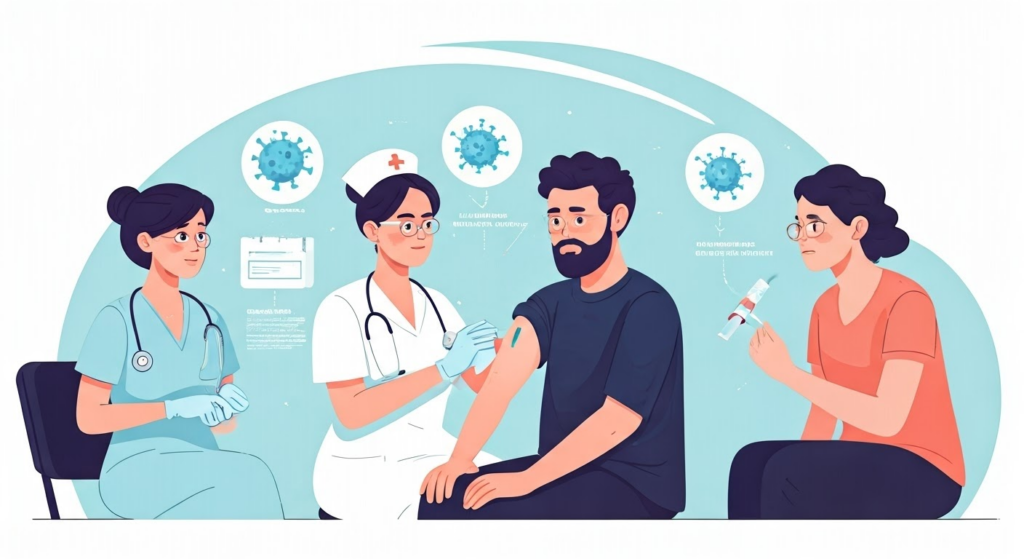Tetanus Shot Side Effects: Risks and Reactions

Key Highlights
- The tetanus shot is a crucial vaccination that protects against tetanus, a serious bacterial infection.
- While generally safe, the tetanus shot can cause side effects, with most being mild and localized.
- Common side effects include pain, redness, and swelling at the injection site, along with mild fever and body aches.
- Serious side effects are rare but require immediate medical attention. These can include allergic reactions and neurological complications.
- Understanding the potential side effects can help individuals make informed decisions about their health.
Introduction
The tetanus vaccine, or tetanus shot, is an important part of public health. It helps protect people from tetanus, which is a serious bacterial infection. Tetanus can cause serious problems for the nervous system. This blog post will explain the tetanus vaccine, why it is important, and some side effects that might happen for people who get it.
Understanding Tetanus and the Need for Vaccination
Tetanus is a serious infection caused by a bacteria that can harm the nervous system. It leads to painful muscle tightening, especially in the jaw and neck, with symptoms of tetanus manifesting as stiffness in these areas. The bacteria, called Clostridium tetani, is often found in places like soil, dust, and waste. You cannot catch tetanus from another person, but if you have a wound, the bacteria can enter your body through that.
The best way to stop tetanus is through vaccination. The tetanus vaccine uses a safe form of the toxin made by the bacteria, known as tetanus toxoid. When you get the vaccine, it helps your immune system make antibodies. These antibodies help protect you from getting a tetanus booster shot in the future. The vaccine is usually given as part of a combination vaccine, like DTaP for kids and Tdap for older teens and adults.
What is Tetanus?
Tetanus is an infection caused by a germ called Clostridium tetani. This germ usually gets into the body through a wound, like a cut or puncture. Once inside, it grows and makes a toxin. This toxin, named tetanospasmin, disrupts signals in the nervous system, leading to muscle stiffness and spasms, making it a serious illness.
These severe muscle spasms can be very strong. They often affect the jaw, neck, chest, back, and stomach muscles. In serious cases, tetanus can result in breathing problems, trouble swallowing, seizures, and even death. The first signs of tetanus can include stiffness and spasms in the muscles, especially in the jaw and neck.
The Crucial Role of Tetanus Vaccination
Tetanus vaccination is very important for public health. It helps to greatly lower the number of tetanus cases around the world. The tetanus vaccine works well and gives long-lasting protection from this serious infection, especially when administered by a health care professional. When someone gets the tetanus vaccine, their immune system starts to make antibodies.
These antibodies help protect them by fighting the toxin if they come into contact with Clostridium tetani. People usually get a first set of vaccine doses when they are kids, and for older children, a schedule of booster shots is important. After that, they need booster shots regularly throughout their lives to keep their protection strong. Getting these booster shots is very important. This is because the vaccine can become less effective over time.
Common Side Effects of the Tetanus Shot

Like any vaccine, the tetanus shot can cause mild side effects. Most side effects are mild and go away on their own in a few days. By knowing these common side effects, people can be ready and manage them better.
Here are some of the most common side effects linked to the tetanus shot.
Local Reactions at the Injection Site
One common side effect is a reaction at the injection site. This is a normal response from the immune system to the vaccine. It shows that the body is starting to build immunity. The place where you got the shot may turn red, swell up, and feel sore, which may vary on the basis of their potential significance.
Some people might also feel itching or notice a hard lump where they were injected. These reactions are usually mild and go away in a day or two. To help with swelling and discomfort, you can use a cool compress on the injection site.
Fever and Body Aches
In addition to reactions at the injection site, some people may have a mild fever and body aches after getting the tetanus shot. This shows that the immune system is working to respond to the vaccine. Fever is a normal reaction when you get vaccinated.
The body makes substances called pyrogens. These substances raise the body temperature to help fight off anything that seems harmful. Body aches can also happen with fever as part of how the body responds. These symptoms are usually mild to moderate and typically go away on their own in a few days.
Uncommon and Serious Side Effects

Most side effects from the tetanus shot are mild and will go away on their own. However, there is a small chance of more serious reactions. These are not common, but they do need immediate medical attention.
It’s important to know about these rare side effects. This way, people can recognize them and get the right medical care if they happen.
Allergic Reactions to the Tetanus Vaccine
In rare cases, some people may have an allergic reaction to the tetanus vaccine. These reactions can be mild or very serious and need medical attention right away. Mild allergic reactions might show up as swelling of the face, hives, or difficulty breathing.
- Hives
- Itching
- Swelling
Severe reactions, called anaphylaxis, are not common but can be life-threatening. Signs of anaphylaxis usually happen quickly and may include difficulty breathing, wheezing, low blood pressure, and passing out.
Neurological Complications Post-Vaccination
Neurological problems after tetanus vaccination are very rare. Still, it’s important to know about these potential risks, including the presence of other medical problems, even if they don’t happen often. One serious condition that might occur in rare cases is called Guillain-Barré syndrome (GBS).
GBS is an uncommon immune disorder that impacts the nervous system. It affects the nerves outside of the brain and spinal cord. The exact reason for GBS is not clear. However, experts think it happens because the immune system mistakenly attacks the body’s own nerves.
Conclusion
In conclusion, it’s important to know the possible side effects of a tetanus shot. Common issues include local reactions and mild fever, which are normal. Serious reactions, including instances related to tetanus infection, can happen but are very rare. If you have bad side effects after getting the shot, get medical attention right away. Remember, the benefits of getting the tetanus vaccine are much greater than the risks. It can protect you from a serious infection. Stay informed and talk to healthcare professionals if you have any worries. Your health is important. If you have more questions or need help, check out our FAQ section or speak with a medical expert.
Frequently Asked Questions
How long after the tetanus shot can side effects occur?
Side effects from the tetanus vaccine usually happen a few hours or days after you get the tetanus shot. If the side effects last for a long time or get worse, it’s important to get medical attention, and you may want to consider the National Vaccine Injury Compensation Program for any legal options available for compensation during a check-up.
Can the tetanus shot cause fever or illness?
Yes, the tetanus vaccine can cause a mild fever as a side effect. This is a normal response from your body and it usually goes away in a day or two. If the fever is high or worries you, it is important to talk to a healthcare professional.
What should I do if I experience severe side effects?
If you or your child has severe side effects, including unwanted effects like trouble breathing, a fast heartbeat, dizziness, or a serious allergic reaction, get help right away. Always seek medical attention in these cases.
Are there any long-term side effects of the tetanus vaccine?
Long-term side effects from the tetanus vaccine are uncommon. Many studies and checks show that the tetanus vaccine is safe. It also provides good long-term protection against tetanus.
https://www.immunize.org/vis/vis_tdap.asp
